Green light for 16-storey King’s Head tower
The state’s planning panel has ticked off a proposal for a 53-metre-tall apartment block behind the heritage-listed King’s Head Hotel, with developers aiming to start construction in 18 months.

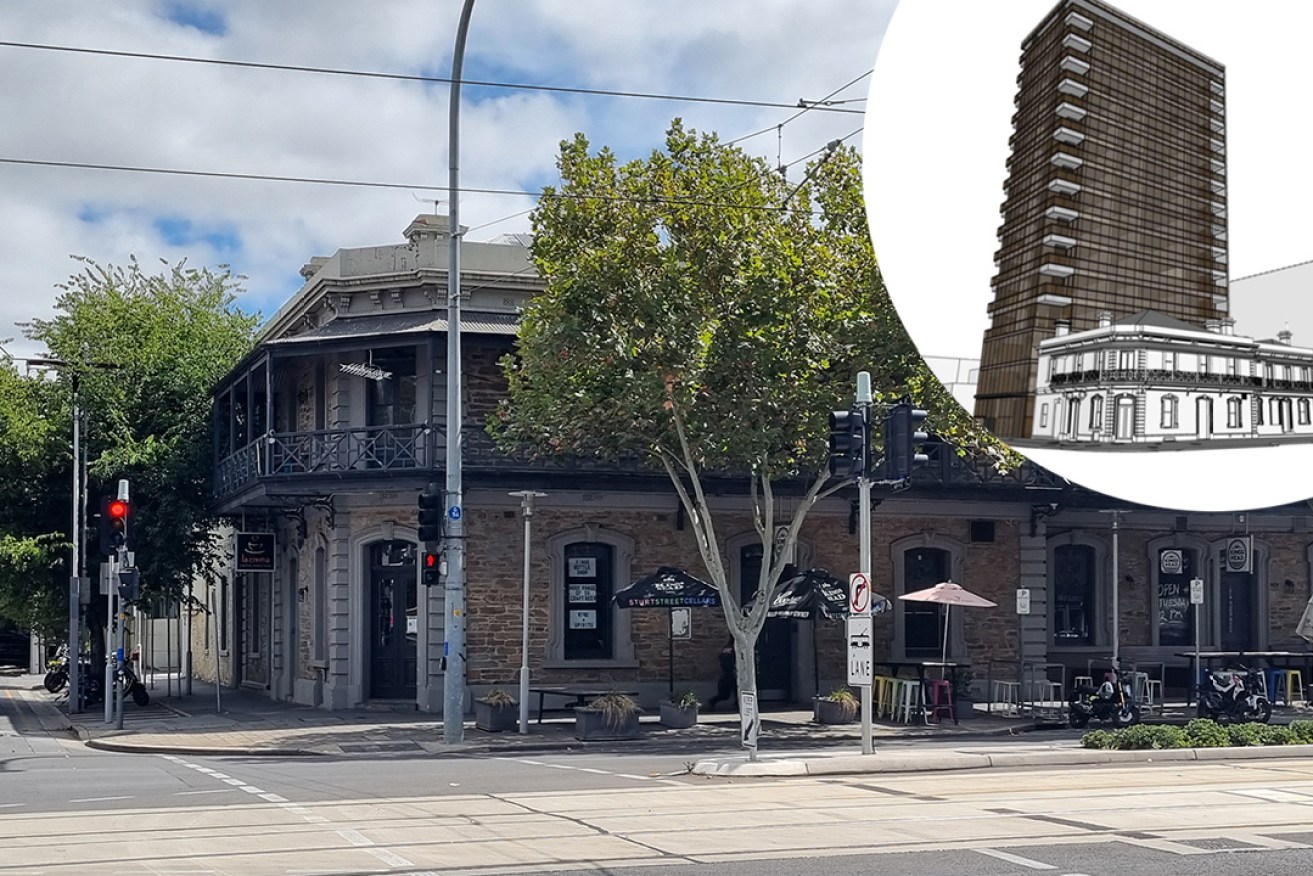
The state heritage-listed King’s Head Hotel on King William Street, with the proposed 53m apartment block at rear. Photo: Thomas Kelsall/InDaily. Inset image: Future Urban
The State Commission Assessment Panel (SCAP) on Wednesday granted planning consent to development consultants Future Urban and Cucci Investments to construct a 16-storey tower – primarily made up of tourist accommodation – directly behind the King’s Head pub in the southern CBD.
Construction of the apartment block will see the two-storey rear wing of the state heritage listed pub demolished but its circa-1870s frontage on King William St and Sturt St retained.
The proposed tower includes 36-serviced apartments, a penthouse suite, level one hotel function area and a ground floor commercial tenancy which is “likely” to be a coffee shop.
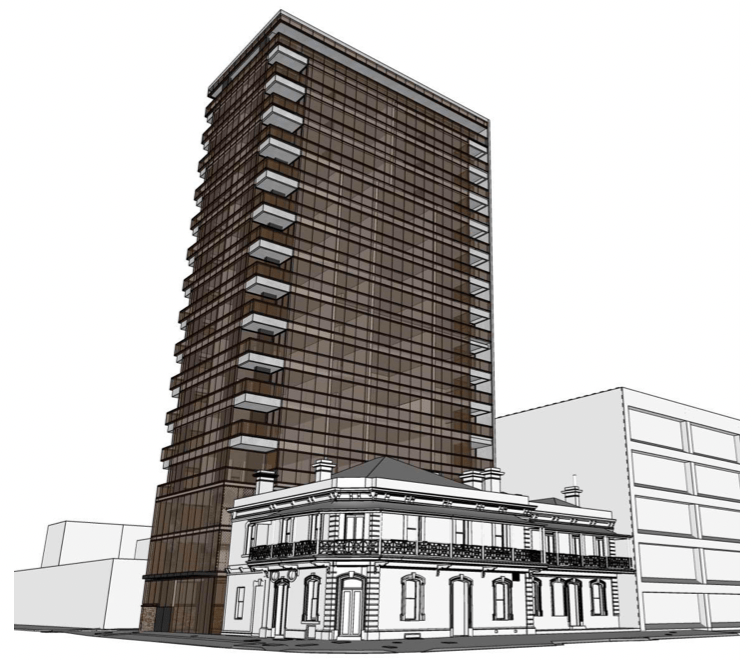
A render of the proposed 16-storey tower at the back of the King’s Head Hotel. Image: Future Urban
Proponents of the 16-storey tower have repeatedly stated their intention to keep the King’s Head operating as a live music venue and “reinvigorate” its social offering, despite concerns it will go the same way of other once-thriving Adelaide music pubs targeted by inner-city apartment developments.
Members of the SCAP resolved yesterday that the development application was “not seriously at variance with the provisions of the Planning and Design Code”.
The project was granted planning consent subject to more than a dozen conditions, primarily concerning heritage and noise reduction.
Future Urban associate director Jason Cattonar said the development consortium had no objections to the conditions imposed by the SCAP, with construction work set to commence in late 2023 or early 2024.
“The applicant’s intentions are to start conservation works on the hotel as soon as possible (balcony, upstairs areas, stone wall), noting that heritage conservation is a key element of the proposal,” Cattonar told InDaily.
“The approved partial demolition works and construction of the serviced apartment tower will commence in approx. 18 months.”
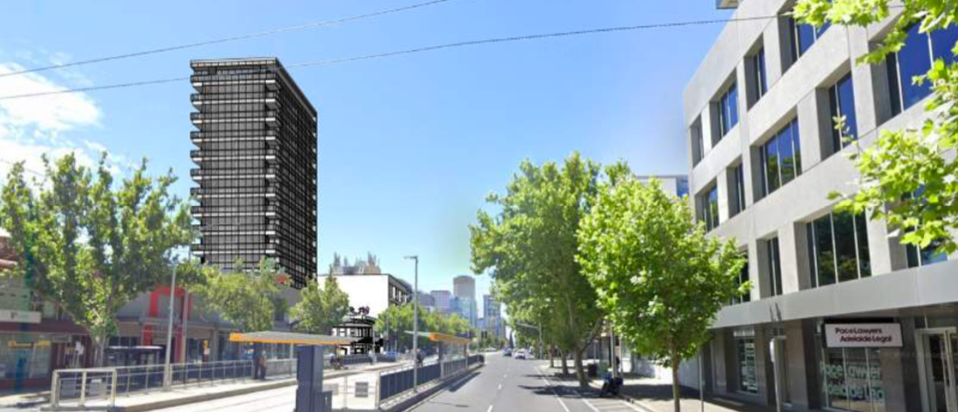
The view of the proposed development from the City South tram station on King William Street. Image: Future Urban
The apartment tower had already received conditional support from the Government Architect, Heritage SA and the Adelaide City Council, although SCAP received 26 representations and a petition (not recognised) with nearly 250 signatures in opposition to the project.
But the assessment panel agreed with the recommendation of senior government planning officer Karen Ferguson, who in an extensive report compiled for the SCAP recommended the project be granted conditional planning consent.
“The application can be supported on the basis of the proposed land uses, the integration of the new development with the existing hotel, the quality and appearance of the design and the proposed height of the development,” Ferguson wrote.
“The proposal is considered to respond appropriately to the relevant objectives and policy outcomes of the Planning and Design Code, and the development is unlikely to result in unacceptable impacts for the locality.”
Ferguson conceded the 16-storey tower was “not consistent with the existing character of the prevailing one to five level development in the immediate locality” but said the building height was permitted by the area’s zoning.
She also said views of the King’s Head Hotel from John Street – directly behind the hotel – would be “significantly changed”, but determined it wasn’t a “fatal flaw” due to “low pedestrian use of the street”.
Ferguson pointed to nearby developments on King William St, such as the 14-storey Tom’s Court Hotel and 15-storey Quest Apartments, as examples of tourist accommodation that have “been built to a similar height as … the proposed building”.
She said the development proposal “supports the tourism, employment and the sustainable future of the King’s Head Hotel”.
The SCAP’s planning conditions require the developer to implement noise reduction recommendations put forward by acoustic engineers BESTEC, who suggested installing double glazed windows in the King’s Head.
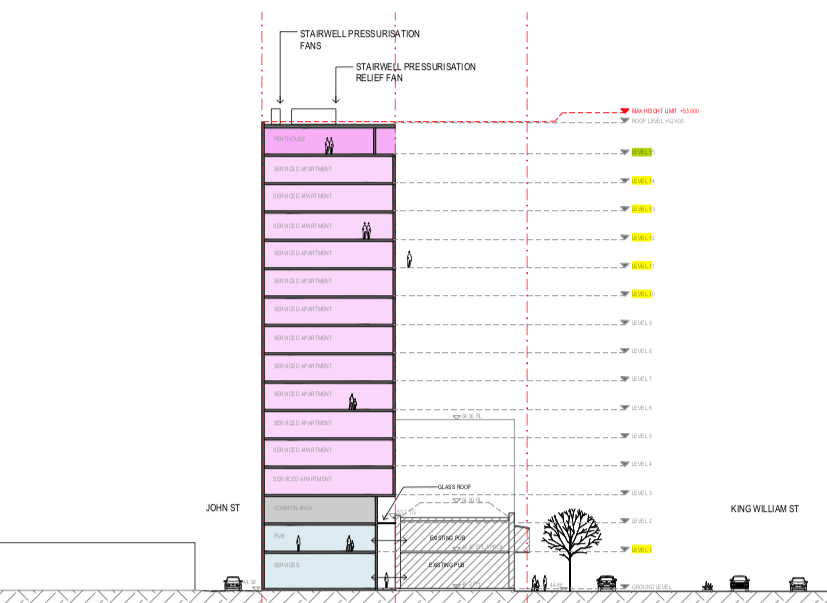
A floor-by-floor diagram of the proposed King’s Head redevelopment.
“The development shall be undertaken in accordance with the recommendations from the BESTEC Acoustic report … in relation to … acoustic sealants, cavity infill, ceiling overlays, water resistance and durability, glazing, façade treatments, sound insulation and room acoustics,” the planning conditions state.
The BESTEC report assumed the pub will still be used as a function space with music at a “typical reverberant sound level of 90dBA”.
The SCAP also imposed conditions mandating that waste collection only occurs between 7am and 6pm on weekdays to “minimise disruption and disturbance to residents in the locality”.
Delivery vehicles servicing the development are also limited to 7am to 10pm arrivals on weekdays and 9am to 9pm arrivals on weekends.
The SCAP agreed to eight further conditions put forward by Heritage SA concerning the preservation and documentation of the King’s Head.
This includes requiring demolition to be undertaken by hand when it concerns building fabric within one metre of the remaining state heritage place.
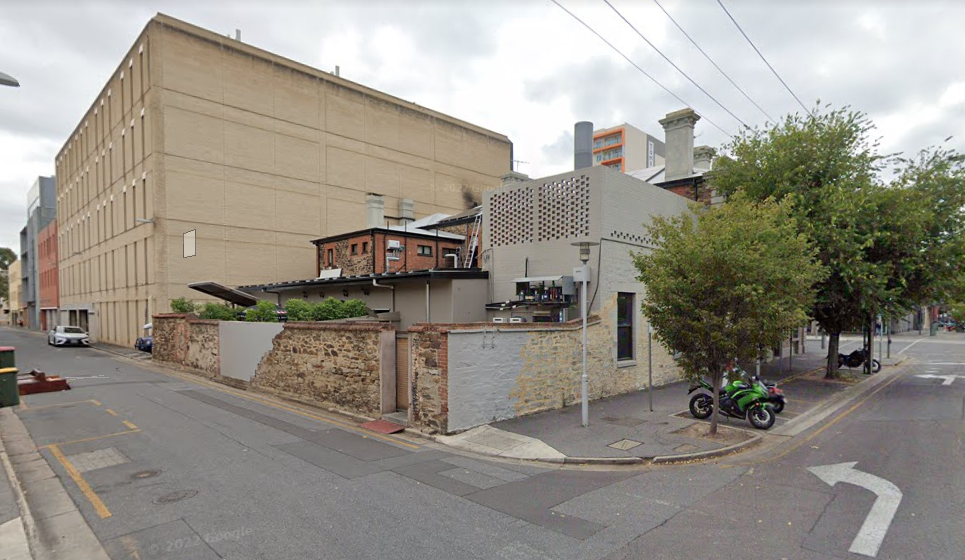
The rear of the King’s Head Hotel facing partial demolition. Image: Google Maps
The government report compiled for the SCAP also dismissed concerns from residents about the apartment development not providing any car parking or vehicle access, arguing that longer term parking demand would be “satisfied using existing paid parking facilities”.
“The site is well serviced with public transport with a tram stop and bus stops immediately adjacent the site on King William Street,” senior government planner Ferguson wrote.
“The site for the tower development is quite narrow at around 14 (metres), which in turn would make onsite access for vehicles problematic in terms of parking space and vehicle manoeuvring.”
Ferguson’s report also revealed the developers rejected a series of recommendations put forward by the Government Architect Kirsteen McKay regarding concerns about how the new development will connect with the heritage hotel.
McKay wrote to Future Urban in April raising concerns about “potential conflict between hotel patrons and residents”, saying she was “not yet convinced by the access arrangement and the potential for interconnectivity”.
“I recommend review of the ground floor configuration and internal planning, with the view to create a genuinely interconnected and open ground floor with a welcoming and generous entry, commensurate with the envisaged residential offering,” McKay wrote at the time.
But Future Urban associate director Jason Cattonar wrote in June saying further integration was not practical.
“Although we acknowledge the GA’s ambitions to create more direct links between the hotel and the central lift lobby, practically speaking, there are limitations with any further ‘integration’ of the lobby given it requires removal of existing walls in the state heritage place, requirements of other authorities and the National Construction Code,” he wrote.
“It is impractical to relocate the core given the limitations of a complex site containing a [state heritage place], the constrained floor plate and the need in tall buildings to have a symmetrical arrangement which gives rise to a more efficient and safer (particularly under earthquake) structure.”
SCAP’s planning consent is valid for two years. The development proponents are still required to obtain building consent before starting construction.
The King’s Head closed its doors in April 2020 after taking a major hit at the start of the pandemic, but the pub reopened in March 2021 under new leasee Patrick Marcucci, who has renovated its interior and brought live music back on Friday and Saturday nights.




